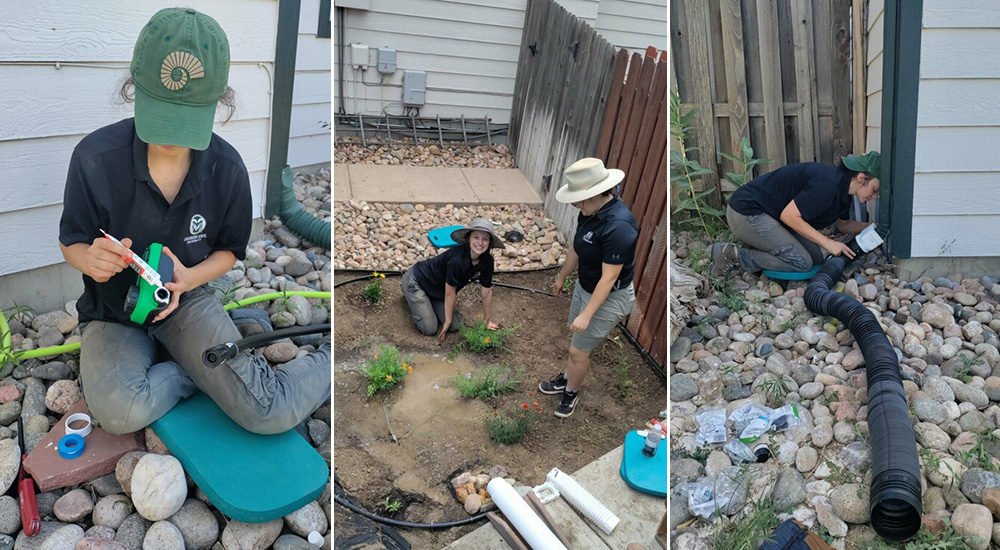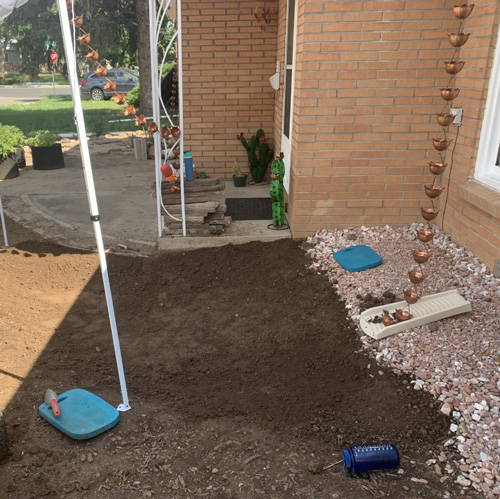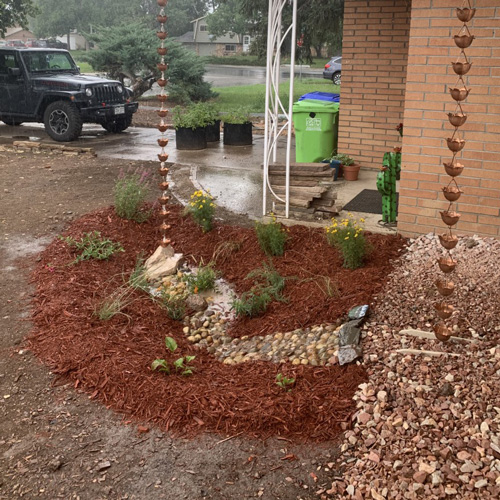Part of a special series highlighting College of Liberal Arts students and their summer internships with CSU Extension

July days spent digging and landscaping can be exhausting and daunting work. But Riley Lynch said a different challenge loomed even larger over her summer internship.
“I killed every plant I ever had before this summer,” admits Lynch, a master’s student in Anthropology and 2022 CSU Extension intern, with a note of exasperation and laughter.
Lynch earned her green thumb this summer, working with the Colorado Stormwater Center, planting rain gardens, ranging from 50 square feet to 100 square feet, at nearly 20 homes across the Colorado Front Range. The pilot rain-garden project focused on removing water-thirsty turf grass at residential homes and replanting it with rain gardens full of native perennial wildflowers, grasses, and mulch. Rain gardens are shallow depressions in the ground created to collect water draining from existing gutter systems in order to allow the rainwater to slow down and infiltrate into the soil. The gardens planted this summer reduce household water demands, create habitat for butterflies, bees, and birds, and help cleanse polluted stormwater runoff as it seeps into the ground.
“Rain gardens are a great alternative to less sustainable landscaping practices because they only need the rain to survive,” said Lynch, who was born in Biloxi, Mississippi and grew up in Colorado Springs. “Even though we don’t get very much rain in Colorado, there are a plethora of gorgeous native plants that evolved to survive in our arid climate. And pollinators love them too!”
An individual rain garden might not look impressive in terms of its water-savings potential but the local and collective benefits are significant environmentally and socially.
“Fifty percent of residential allocated water in Colorado is used for outdoor landscaping, especially turf grass,” Lynch said. “We’re reallocating the water that falls onto lawns. Rain gardens require less water, no fertilizers and even help filter stormwater and runoff that can carry toxins into the ground and ultimately back into rivers.”
Lynch completed her undergraduate degree at CSU in 2020, majoring in Watershed Science and minoring in Environmental Affairs. Through her coursework and experiences, Lynch realized that while she loved physical science, she was drawn to better understand and work on the social- and political-justice dimensions of water management. That led Lynch to pursue an anthropology master’s degree, working with Associate Professor Heidi Hausermann.
“Riley is so unique in that she understands biophysical systems and theory. She brings 110 percent effort and a critical eye to everything she does, and she is so committed to environmental justice,” Hausermann said. “She didn’t come into the Anthropology program planning to work on the rain garden project for her MA, and I’m so glad she did. It’s a great fit for her skills, and a gorgeous example of the kind of applied work that can happen through universities.”

Lynch’s interests led her to work with the Colorado Stormwater Center at the start of 2022. The center, a unit of the CSU Department of Civil and Environmental Engineering, provides education and outreach on stormwater management to homeowners, businesses, industry, and communities. As the Rain Garden Program Assistant for the center last spring, Lynch wrote a guide that informs homeowners how and why they can make and use sealable rain barrels that collect stormwater from downspouts for watering gardens. The resources are available as a booklet and online.
Through the Extension internship program, Lynch continued her work with Jessica Thrasher, the center’s Director of Education and Outreach, and Mia Campbell, the Stormwater Center Intern, installing rain gardens. The Rain Garden Team worked with several Front Range municipalities, the Colorado Water Conservation Board, and the Colorado Water Center to sponsor a limited number of rain-garden installations around their cities – free to homeowners. Flyers and announcements for the program were posted online and at community centers and libraries in both English and Spanish, with Thrasher, Lynch, and Campbell leading a targeted effort to reach diverse homeowners and communities.
“There is a gap in available education, resources, classes for Spanish-speaking communities in the water field in general, but specifically in stormwater,” Thrasher said. “At the Colorado Stormwater Center, we are focusing on language justice and ensuring that communities have equal access to information.
“Additionally, many stormwater programs are only promoted in English, leaving out Spanish speaking community members. For the Rain Garden Pilot Program, we ensured that diverse community members would be able to participate in the project by creating bilingual marketing materials, educational materials, and homeowner resources. As our water resources continue to dwindle, all communities need to have access to tools, resources, and education on how to conserve and protect our water now and for future generations. This project was one step forward towards that goal.”
Historically, communities of color and non-native English speakers and other marginalized populations are situated closer to power plants, incinerators, and other sources of pollution and environmental harm. Rain gardens represent modest yet equitable environmental goods and “good” to homes and neighborhoods that are easily situated in under-served areas.
“We got hundreds of requests,” Lynch said, far surpassing their resources to install 20 gardens.


Thrasher, Lynch, and Campbell spearheaded one- to two-day garden installations from Greeley to Longmont to Centennial, typically arriving at a home by 8 a.m. and digging, scraping, hauling, and planting until 5 p.m., and sometimes later many days. Using shovels and pickaxes, the Rain Garden Team and volunteers would clear patches of lawn and then replant the area with native shrubs and wildflowers, such as Blue Flax, Rocky Mountain Penstemon, and Chocolate flower and mulch.
“This project would not have been possible without Riley. She brought a tremendous amount of enthusiasm, excitement, and passion for stormwater education, rain gardens, and environmental justice,” Thrasher said. “She managed all communications with over 300 applicants and the 20 selected program participants. She co-taught the three-hour Certified Rain Garden Installer Course. She sourced nearly 600 native plants, and led multiple rain garden installations with groups of youth and adult volunteers.
“She also ensured that everyone involved in the project, from the homeowners to the volunteers, learned something on installation days. She helped each person find something new to try and have fun while making a significant impact with the pilot project.”
“It was amazing and rewarding to do this work, and we got lots of questions when we were installing gardens, even from people driving by. The people we talked to were really excited about water conservation. There’s a clear demand and desire for this work.” — Riley Lynch
Through the summer, Lynch worked with youth volunteer groups, including Groundwork Denver. Often, Lynch, Thrasher, and Campbell worked as a three-person crew, a particularly rewarding and empowering experience, according to Lynch. The team’s family members also volunteered throughout the summer. In order to communicate with non-native English-speaking residents, translators accompanied the work crews to some homes. The center thanked the translators by installing rain gardens at their homes, too.
“People are so often portrayed as not caring about resources and conservation,” Lynch said. “It was amazing and rewarding to do this work, and we got lots of questions when we were installing gardens, even from people driving by. The people we talked to were really excited about water conservation. There’s a clear demand and desire for this work.”
Internships: The Practical and Applied Side of the Liberal Arts
The CSU Summer Extension Internship program gives students the opportunity to take their research and expertise into the field to help communities across Colorado in the areas of Natural Resources and Sustainability, Food and Agriculture, Youth Development, Economic and Community Development, Health and Well-Being, and Emergency Planning and Resources.
In summer 2022, the College of Liberal Arts had 18 students participate in an Extension internship.